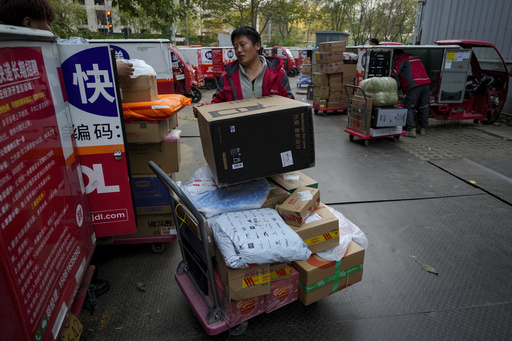
HONG KONG — E-commerce companies in China have noted a surge in both shopper numbers and sales during this year’s Singles’ Day shopping festival, although comprehensive data on total sales remains undisclosed.
Alibaba, the parent company of platforms like Taobao and Tmall, reported that 45 brands, including major names like Apple, Nike, and local appliance leaders Haier and Midea, exceeded 1 billion yuan (approximately $138.3 million) in gross merchandise value, which indicates the value of items sold.
In a statement released on Tuesday, Alibaba highlighted that both Taobao and Tmall experienced strong growth in gross merchandise volume—a vital sales metric for the festival—along with a record participation of buyers, although it did not disclose specific figures. The company further revealed that the number of its paid membership program, 88VIP, customers who made purchases during the event increased by over 50%.
Competitor JD.com reported on Tuesday that its shopper numbers during the Singles’ Day event rose by 20%, alongside achieving double-digit growth in both transaction volumes and orders. Unlike previous years when Alibaba and JD.com shared final sales figures for Singles’ Day, both have opted not to do so since 2022. However, outside estimates suggest that sales growth has diminished since the COVID-19 pandemic.
According to Syntun, a data analytics firm, the gross merchandise volume across major e-commerce sites increased by only 2% last year, totaling 1.14 trillion yuan (about $156.40 billion), a stark contrast to the double-digit growth reported prior to the pandemic—evidence of a sluggish domestic economy and subdued consumer confidence.
Alibaba created this significant shopping event on November 11, 2009, designed to attract consumers through enticing discounts. Referred to as “Double 11,” the festival has since been adopted by other platforms in China, such as JD.com and Pinduoduo, and even gained traction internationally.
The event is regarded as a key indicator of consumer sentiment in China. To remain competitive against discount platforms like Shanghai’s Pinduoduo, Alibaba and JD.com have provided billions in subsidies to reduce product prices for shoppers.
Alibaba indicated that categories such as home appliances and furniture saw favorable sales this year, thanks to the combined influence of platform discounts and government-backed subsidies. Emerging product categories included collectible toys and items geared towards sports and outdoor activities.
“There’s a noticeable shift in consumer preferences towards spending on experiences, hobbies, and health-related products,” remarked Jacob Cooke, CEO of e-commerce consultancy WPIC Marketing + Technologies. He noted that consumers are increasingly focusing on emotional and social aspects of their purchases, investing more in products that enhance their social interactions or overall well-being. Cooke observed a movement away from luxury items towards premium brands that better resonate with consumers’ lifestyles.
In line with these trends, sportswear brand Lululemon experienced a significant milestone, reaching $1 billion in sales in China for the first time, positioning the country as its second-largest market after the United States. JD.com also noted a strong interest in large-screen televisions, along with various appliances such as robotic vacuum cleaners, air conditioners, and dryers, reflecting the high demand for winter products.
